
Did you know that the profitability of small businesses might rise by as much as 20% due to good bookkeeping? It involves more than just maintaining records; it guides your company toward financial success.
Learning the art of bookkeeping is essential in the fast-paced world of small enterprises, where every choice matters. However, let’s face it!
Bookkeeping may be a confusing world of statistics and rules for many small business owners. Time restraints, the intricacy of handling finances, and the requirement for precision can make bookkeeping a significant source of discomfort. Do you need help with spreadsheets, getting lost in receipts, and stressing over paying your taxes?
You’re not by yourself.
Here’s when Paci.ai gets useful. Imagine having a personal bookkeeper who knows your business inside out but also assists in classifying your expenses and organizing your books. So, let’s start!
Bookkeeping Basics
If you run a small business, you have undoubtedly heard the term “bookkeeping” used more times than you can remember. But what is it, and why is it crucial to your company’s financial health?
Fundamentally, bookkeeping is the art of keeping track of, arranging, and overseeing financial activities in your company. All of your company’s financial transactions, from supplier invoices to customer payments, are included in these transactions. Though it may seem complicated, consider bookkeeping the foundation of your company’s financial stability.
Why Does Bookkeeping Matter for Small Companies?
You may now be asking yourself, “Why bother with bookkeeping?” The truth is that it forms the basis for making well-informed decisions. It functions similarly to a financial compass to guide you through the rough seas of entrepreneurship. This is the reason why bookkeeping is essential:
1. Precise Documentation
Bookkeeping guarantees that every financial transaction is appropriately recorded. This eliminates the need to search for misplaced receipts or wonder where the cash went.
2. Financial Clarity
It offers an unmistakable image of the financial well-being of your company. You can easily keep track of your earnings, outlays, and profits.
3. Tax Compliance
During tax season, accurate bookkeeping is your best friend. It assists you in calculating taxes due, claiming deductions, and avoiding trouble with the IRS.
4. Company Growth
You can estimate future financial demands, spot patterns, and make data-driven decisions that move your firm ahead with well-maintained financial records.
Essential Elements of Bookkeeping
Now that you understand the significance of bookkeeping let’s examine its fundamental elements:
1. Ledgers
These resemble the separate sections of your financial narrative. This is for particular accounts, such as revenue, expenses, assets, liabilities, and ledger record transactions.
2. Journals
Visualize journals as those chapters’ pages. They maintain a thorough history of financial activity by chronologically documenting transactions.
3. Financial Statements
Your financial story ends with your financial statements. These consist of your cash flow statement, balance sheet, and profit and loss (P&L) statement. These reports provide information about your company’s assets, liabilities, and cash flow.
Practical Steps to Efficient Bookkeeping
You wear numerous hats as a small business owner, from CEO to customer service representative. However, one position crucial to your business but often overlooked is that of the vigilant bookkeeper. We’ll walk you through the steps for effective bookkeeping so you feel easy to ensure your company’s finances are in capable hands.
1. Configuring the Bookkeeping System
Before diving in completely, you should ensure your system meets your company’s needs. This is where you have to make a vital choice: software-based bookkeeping or manual bookkeeping.
- Manual bookkeeping
Transactions are recorded using paper ledgers and journals in this age-old technique. Although it can work well for small firms, it takes a lot of effort and is prone to mistakes.
- Software-Based Bookkeeping
Among other software solutions, Paci.ai’s bookkeeping and tax suite provides a more intelligent and practical approach to handling your accounts in the digital era. They minimize human error, automate several procedures, and offer up-to-date financial health information for your company.
Selecting the best system is primarily determined by the scale and complexity of your company. The best option for managing an expanding business is software-based bookkeeping.
2. Maintaining a Record of Transactions
After deciding on your bookkeeping technique, let’s go into the specifics of transaction recording. This process is similar to assembling your company’s financial jigsaw.
Here’s a detailed how-to:
- Sales Transactions
Keep track of every sale your company makes. Add information such as the date, clientele, goods or services rendered, and the total amount.
- Expense Transactions
Maintain a record of all your costs, including utilities and office supplies. To make things simpler for tax purposes, group your costs.
- Bank and Credit Card Transactions
Ensure your bookkeeping records and bank and credit card statements are regularly reconciled. This guarantees precision and aids in detecting inconsistencies.
3. Managing Cash Flow
The lifeblood of your company is its cash flow. Your business could come to a complete stop without it. Here’s how to successfully manage cash flow:
- Create a Cash Flow Forecast
Estimate your future earnings and outlays. This lets you plan and make wise decisions by anticipating monetary surpluses or shortages.
- Maintain Receivables and Payables
Receivables are the people who owe you money, and payables are the people you owe. Thus, it is important to have effective management of receivables and payables for good bookkeeping. Taking prompt action against outstanding bills might help your cash flow.
- Create a Cash Reserve
Put some of your earnings away for investments or unexpected expenses. It serves as a precaution for unpredicted costs or openings.
By implementing these doable actions, you’ll gain control over your company’s financial health and expedite your bookkeeping.
Common Bookkeeping Mistakes to Avoid
For small businesses, efficient bookkeeping is essential to easy financial transaction management. Nonetheless, many business owners unintentionally commit frequent bookkeeping errors that might have serious consequences. We’ll highlight these mistakes in this section and provide helpful advice on how to avoid them.

1. Avoiding Periodic Validation
- Mistake
Some business owners need to correct this when comparing their bank and credit card bills to their bills. There may be differences in your financial records due to this error.
- Solution
Develop the practice of routinely reviewing your accounts. Ensure each transaction is recorded and any inconsistencies are quickly resolved. By doing this, you can keep your financial statements accurate.
2. Combining Finances from Personal and Business
- Mistake
For small business owners, it can be simple to mix up personal and business finances. Combining the two can make tax reporting more complex and confusing.
- Solution
Get a credit card and bank account separately for your business. Effectively tracking revenue and expenses is made easy by this separation, guaranteeing that company-related operations are separated.
3. Insufficient Documentation
- Mistake
Keeping thorough and well-organized records can result in noticed tax deductions, trouble with taxes, and trouble monitoring financial performance.
- Solution
Put in place a systematic procedure for keeping records. Keep track of all transactions, file invoices and receipts, and appropriately classify your spending. For greater efficiency, think about utilizing Paci.ai or other bookkeeping software.
4. Failure to backup financial data
- Mistake
Losing data can have disastrous effects. It’s dangerous to rely on multiple copies of your financial information.
- Solution
Make regular backups of your financial information to the cloud or another safe location. This guarantees the safety of your records in the event of calamities or hardware malfunctions.
5. Neglecting Tax Due Dates
- Mistake
Missing tax time limits can result in penalties and added stress.
- Solution
Create reminders and mark significant tax deadlines on your calendar. Consider collaborating with a tax expert or using software like Paci.ai, which offers tax compliance reports and frequent reminders.
6. Disregarding Technological Developments
- Mistake
Ignoring automation and bookkeeping software might result in inefficiencies in today’s digital age.
- Solution
Use technology to make bookkeeping operations more efficient. Automating data entry, generating real-time financial reports, and streamlining tax compliance are all made easier with software solutions such as Paci.ai.
Advanced Bookkeeping Tips for Growth
Bookkeeping is a powerful instrument that may propel your small business toward greater success. We’ll go beyond the fundamentals in this section and introduce you to sophisticated bookkeeping tips to enable you to make better business decisions.
1. Budget
Not only do big businesses use budgets. It’s also a valuable approach for small companies. Projecting your future income and expenses over a given time frame—typically a year—is necessary when creating a budget. However, why is it essential?
You can see your financial goals and limitations by creating a budget. It facilitates resource allocation, growth planning, and cost-cutting identification. Additionally, having a budget gives you a standard against which to assess your financial success.
2. Cash Flow Management
Small companies must practice effective cash flow management. You can forecast changes in your cash flow, ensure you have adequate working capital to pay bills, and take advantage of possibilities by reviewing your bookkeeping records.
3. Finding Key Performance Indicators (KPIs)
Key performance indicators (KPIs) are critical to success in every industry. Metrics like gross profit margin, client lifetime value, and customer acquisition cost could be examples. You may stay focused on your objectives and make data-driven decisions by monitoring the KPIs pertinent to your company.
4. Seek Expert Advice
Even if you have sophisticated bookkeeping knowledge and tools, complex financial issues could call for professional guidance. Seek advice without delay from a qualified bookkeeper or accountant like Paci.ai. They can assist you in navigating complex financial matters, guarantee tax compliance, and offer strategic direction.
You’ll be able to steer your small business toward sustainable growth and preserve a solid financial base by putting these advanced bookkeeping suggestions into practice.
Paci.ai Bookkeeping and Tax Suite
Paci.ai’s Bookkeeping and Tax Suite is a comprehensive solution created with small business owners in mind, not simply software.
Let’s examine its main attributes:
1. Usability
Our program is easy to use; you don’t have to be an expert in finances to use it. Paci.ai takes pride in its intuitive design, which makes it possible for even the least tech-savvy people among us to handle money management.
2. Comprehensive Coverage
We recognize that you need more than basic bookkeeping for your small business. A broad range of financial topics are covered by our package, such as accounting, tax compliance, bookkeeping, and spending monitoring. It’s a comprehensive solution that makes managing your finances easier.
3. Real-Time Financial Insights with Paci.ai
With real-time financial insights that are critical to your organization, Paci.ai gives you the capacity to:
- Access to Financial Statements
- Data-Driven Decision Making
4. Simplifying Tax Compliance and Reporting
Small business owners frequently worry about tax compliance, and Paci.ai is here to make it easier:
- Simplifying Tax Compliance
- Effective Reporting
Conclusion
In short, it is now time for you to take action after discovering more about bookkeeping for small businesses and how Paci.ai may be your reliable financial management partner. A strategic step toward the expansion and success of your company, implementing or upgrading your bookkeeping procedures, is more than just a responsibility.
Your financial strategy can shape your small business’s future success today. So go ahead and make the move. Witness the evolution of your bookkeeping experience as you explore the possibilities with Paci.ai. We are here to give your business the best that it deserves.
For yourself, discover the difference by getting in touch with us. Your business deserves nothing less than excellence in bookkeeping, and Paci.ai is here to provide it.